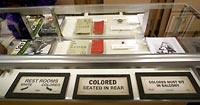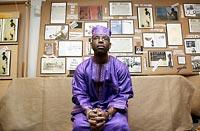Symbols of slavery put on exhibit

They are crude reminders of a painful past: A runaway slave collar — circa 1800. Branding irons. Shackles. A shotgun.
They are part of a small collection of African-American memorabilia that Delbert Richardson has kept in safe-deposit boxes or on display in his Central Area home in Seattle. Recently, the 51-year-old began putting his collection on exhibit as a way, he said, to help people — particularly children and young adults — understand a sometimes overlooked part of American history.
But rather than housing his collection in a single location, Richardson plans to take it on the road — to schools and community and senior centers, and in private showings.
Along with the timeworn symbols of slavery, Richardson uses posters and newspaper clippings to roughly trace the experiences of Africans in America — from their early arrival on slave ships, through the Jim Crow era of the 1940s, '50s, and '60s, reaching into the modern day.
The exhibit also lists or displays — sometimes in miniature — everyday products invented or patented by African Americans — the ironing board, cellphone technology, golf tees, pencil sharpener and ice-cream scoop among them.
Richardson recognizes the challenge in attracting an audience.
"Some people don't want to be associated with slavery because it's too painful," he said. "They'll say: 'I don't want to talk about slavery. I wasn't there,' " he said. "I understand that."
On a recent weekend, Kent residents Kimberly and Sean Ringor took their two children and a family friend through Calm Rain Designs Studio, a gallery space available for community exhibits on Jackson Street, where Richardson's collection was on display.
Sean Ringor said the collection provides a rare glimpse of history. He'd never seen a real slave shackle, he said. His wife, Kimberly Ringor, said the exhibit is a way for children to learn the brutal truth about their past and to take pride in past and current accomplishments of blacks.
Richardson, a former buyer for Costco who for now is spending his time enhancing his collection, said the exhibit is geared toward children and young adults, like the Ringor children, as a way for them to learn what they often don't learn from history books.
He began collecting pieces 20 years ago, beginning with labels on fruit crates that carried the images of black people and with advertising posters for Cream of Wheat.
Over the years, he intensified his collecting.
His collection includes a shotgun, which he said was used to trade with African leaders for slaves and to put down resistances.
Slave-ship and plantation owners used the branding iron to mark enslaved Africans with their initials. And the shackles were used to transport slaves. His collection also includes documents of slavery and copies of news clippings from the era.
Richardson said his collection is an investment and, for now, the exhibits are free. He plans to have another public exhibit at Calm Rain Designs in April. The date is not set.
"I'm not interested in making money," he said. "I'm interested in making an impact."
Lornet Turnbull: 206-464-2420 or lturnbull@seattletimes.com


Seeing the collection![]()
![]()
To arrange an exhibit or to get more information, phone Delbert Richardson at 206-772-9409.